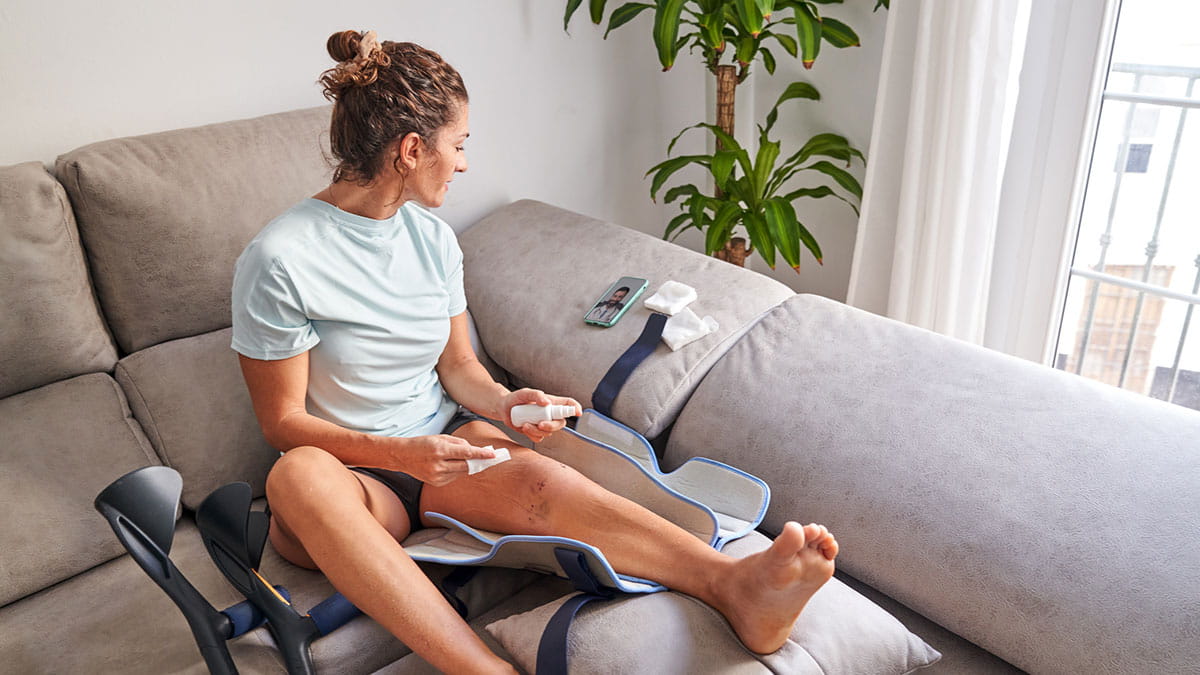Blog article
Elective surgery 101: Post-surgery care at home

Recovering from surgery can feel like a daunting process, but being prepared can make all the difference.
In this blog, we cover essential tips to help you manage your recovery effectively, from wound care and pain management to keeping an eye on your mental health.
With the right support, you’ll be back on your feet and feeling like yourself again in no time.
1. Set up a restful recovery space
Even before you arrive home, it’s essential to prepare a dedicated recovery space. This could be a comfortable spot in your bedroom or living room (or most likely, both) with easy access to essentials like water, healthy snacks, and entertainment. Make sure your space includes:
Comfortable seating and/or bedding: Arrange cushions, pillows, and blankets for maximum comfort, ensuring you have proper support to avoid strain.
Easy access to personal items: Keep important items within arm’s reach, like your phone, medication, and books or devices to keep you occupied.
Mobility aids if needed: Depending on your surgery, you may need mobility aids like a walker or crutches. Ensure these are easily accessible and properly fitted for you.
2. Follow your specialist’s wound care instructions
Proper wound care is critical for avoiding infections and promoting faster healing. Your healthcare provider will likely give you detailed instructions, but here are some general tips:
Keep the wound clean and dry: Follow any instructions regarding when it’s safe to shower or change dressings. Use clean, dry dressings to cover the wound if needed.
Monitor for signs of infection: Look out for redness, swelling, increased pain, or discharge. If you notice any of these or feel unwell or feverish, contact your specialist immediately.
Avoid touching the wound: As tempting as it may be to check on your progress frequently, avoid handling the wound unnecessarily, as this can introduce bacteria and slow down healing.
3. Manage your pain responsibly
Pain management is a key aspect of post-surgery recovery. Follow the advice given by your specialist to manage pain effectively:
Stick to prescribed medications: Take your pain medications as instructed and never exceed the recommended dosage. If you have any concerns about side effects, discuss them with your specialist.
Use non-medication pain relief strategies: Depending on your situation, you might benefit from using ice packs, heat therapy, or relaxation techniques like deep breathing to manage pain.
Stay ahead of the pain: Don’t wait for the pain to become severe before taking medication – by taking your medication exactly as prescribed, you can help maintain a manageable level of discomfort.
4. Prioritise rest and sleep
While it’s important to stay mobile and follow any rehabilitation and/or exercise instructions, rest is equally vital for your body’s recovery. Make sure you’re getting enough sleep each night and take naps during the day if needed:
Stick to a sleep schedule: Try to go to bed and wake up at the same time each day to support your body’s natural healing processes.
Create a calming bedtime routine: Wind down with relaxing activities like reading or listening to soothing music to help improve sleep quality.
5. Attend all follow-up appointments
Follow-up appointments are an essential part of your post-surgery care plan. These appointments allow your doctor to monitor your healing progress and address any complications that may arise.
Keep track of your appointments: Use a calendar or reminder app to stay on top of your scheduled follow-ups. Missing an appointment can delay your recovery or leave complications unaddressed.
Prepare questions for your doctor: If you have any concerns or notice unusual symptoms during recovery, write them down and bring them up during your follow-up visits. This is your opportunity to get expert advice and reassurance.
Review any ongoing care instructions: During these appointments, your doctor may update your care plan or provide new instructions, such as when you can resume normal activities or adjust your medications.
6. Keep an eye on your mental health
Physical recovery is only one part of the process – your mental and emotional wellbeing is just as important. It’s common to feel low or anxious after surgery, especially if recovery takes longer than expected. Here are a few ways to stay mentally strong:
Practice self-compassion: Recovery can be frustrating, especially if progress is slow. Remind yourself that healing takes time and is often non-linear. Take things day by day and remember it’s okay to take two steps forward and one step back.
Reach out for support: Don’t hesitate to lean on loved ones or seek help from a professional if you’re struggling emotionally. Talking about your feelings can ease stress and anxiety.
Incorporate relaxation techniques: Mindfulness exercises, gentle stretches, and breathing techniques can help you manage stress and stay positive during recovery.
Recovering from surgery can be challenging, but with the right approach, you can create an environment that supports healing and well-being.
This article contains general information only and does not take into account the health, personal situation or needs of any person. In conjunction with your GP or treating health care professional, please consider whether the information is suitable for you and your personal circumstances.


